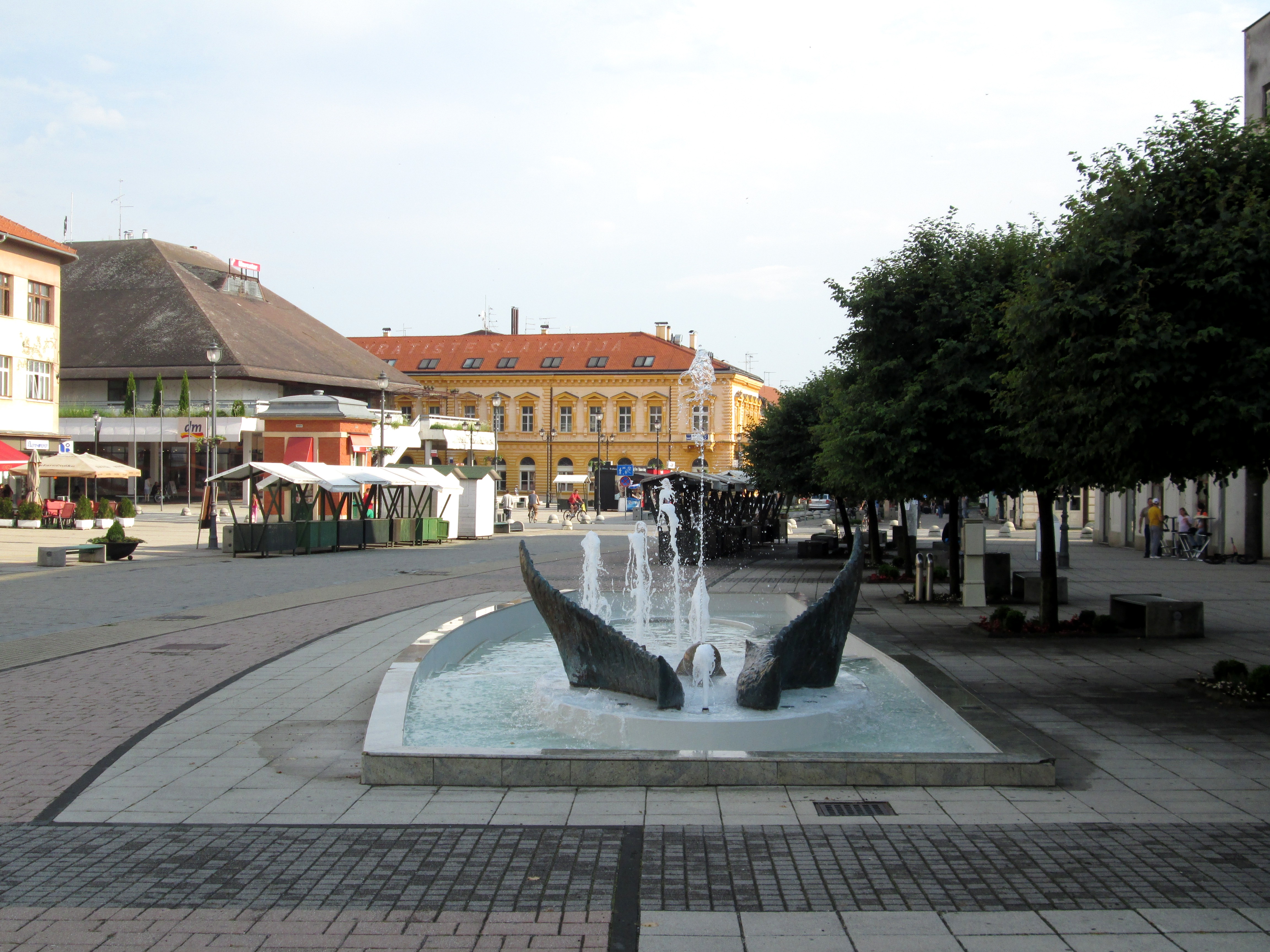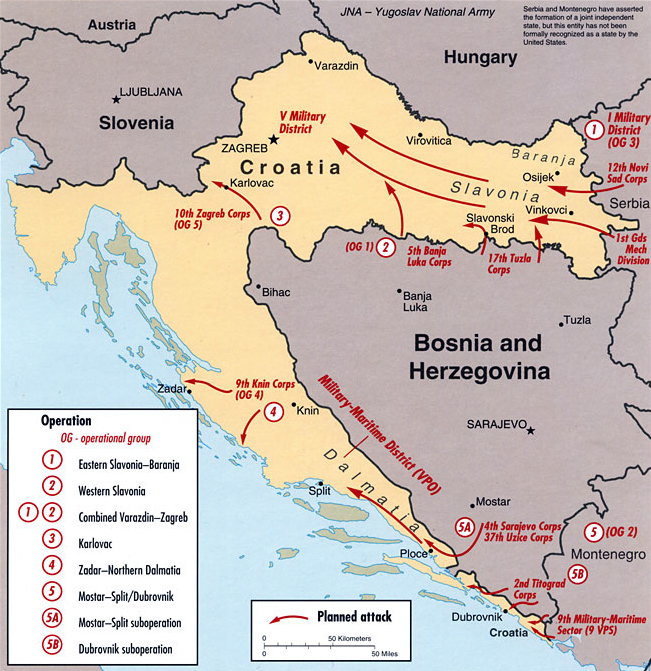|
Operation Swath-10
Operation Swath-10 ( hr, Operacija Otkos-10) was a military offensive undertaken by the Croatian Army (''Hrvatska vojska'', or HV) against the SAO Western Slavonia Territorial Defense Forces on Bilogora Mountain in western Slavonia. Occurring from 31 October to 4 November 1991, during the Croatian War of Independence, the operation was a Croatian victory and its success set the stage for follow-up advances by Croatian forces on Papuk Mountain in Operation Papuk-91 in late November and December. By the end of the year the HV gained control of Papuk, securing transport routes between eastern Slavonia and the rest of Croatia. The offensives were accompanied by the displacement of most of the Croatian Serb population of the area captured by the HV. The refugees initially fled to Bosnia and Herzegovina, but the majority were soon settled in the JNA-held Baranja region of eastern Croatia. The offensive provoked accusations that Croatian troops had committed ethnic cleansing and ... [...More Info...] [...Related Items...] OR: [Wikipedia] [Google] [Baidu] |
Croatian War Of Independence
The Croatian War of Independence was fought from 1991 to 1995 between Croat forces loyal to the Government of Croatia—which had declared independence from the Socialist Federal Republic of Yugoslavia (SFRY)—and the Serb-controlled Yugoslav People's Army (JNA) and local Serb forces, with the JNA ending its combat operations in Croatia by 1992. In Croatia, the war is primarily referred to as the "Homeland War" ( hr, Domovinski rat) and also as the " Greater-Serbian Aggression" ( hr, Velikosrpska agresija). In Serbian sources, "War in Croatia" ( sr-cyr, Рат у Хрватској, Rat u Hrvatskoj) and (rarely) "War in Krajina" ( sr-cyr, Рат у Крајини, Rat u Krajini) are used. A majority of Croats wanted Croatia to leave Yugoslavia and become a sovereign country, while many ethnic Serbs living in Croatia, supported by Serbia, opposed the secession and wanted Serb-claimed lands to be in a common state with Serbia. Most Serbs sought a new Serb state within a Yugos ... [...More Info...] [...Related Items...] OR: [Wikipedia] [Google] [Baidu] |
Bosnia And Herzegovina
Bosnia and Herzegovina ( sh, / , ), abbreviated BiH () or B&H, sometimes called Bosnia–Herzegovina and often known informally as Bosnia, is a country at the crossroads of south and southeast Europe, located in the Balkans. Bosnia and Herzegovina borders Serbia to the east, Montenegro to the southeast, and Croatia to the north and southwest. In the south it has a narrow coast on the Adriatic Sea within the Mediterranean, which is about long and surrounds the town of Neum. Bosnia, which is the inland region of the country, has a moderate continental climate with hot summers and cold, snowy winters. In the central and eastern regions of the country, the geography is mountainous, in the northwest it is moderately hilly, and in the northeast it is predominantly flat. Herzegovina, which is the smaller, southern region of the country, has a Mediterranean climate and is mostly mountainous. Sarajevo is the capital and the largest city of the country followed by Banja Luka, Tu ... [...More Info...] [...Related Items...] OR: [Wikipedia] [Google] [Baidu] |
Daruvar
Daruvar ( cz, Daruvar, german: Daruwar, hu, Daruvár, sr, Дарувар, la, Aquae Balissae) is a spa town and municipality in Slavonia, northeastern Croatia with a population of 8,567. The area including the surrounding villages (Dar. Vinogradi, Doljani, Donji Daruvar, Gornji Daruvar, Lipovac Majur, Ljudevit Selo, Markovac, and Vrbovac) has a population of 11,633 as of 2011. It is located on the foothills of Papuk mountain and along the Toplica River. The main political and cultural centre of the Czechs of Croatia, Czech national minority in Croatia, it has a winemaking tradition reportedly dating back more than 2,000 years. Geography * Coordinates: * Area: 64 km2 * Altitude: 190 m Daruvar is located 125 km from Zagreb, the national capital, and 130 km from Osijek, the main city of Slavonia to the east. The closest cities are Pakrac, Lipik, Novska, Križevci, Croatia, Križevci, Bjelovar, and Virovitica. Administration Daruvar is located in the Bjelovar-Bi ... [...More Info...] [...Related Items...] OR: [Wikipedia] [Google] [Baidu] |
Okučani
Okučani is a village and municipal centre in western Slavonia, Croatia. It is located 19 km southeast of Novska and 17 km west of Nova Gradiška.Okučani Entry in . Access date 29th July 2021. History Before 18th century, village was known by the name of ''Dijanovci'', when it was renamed in Okučani, by the ("okuka") of the Sloboština river. Okučani was captured and incorporated into the Serbian Autonomous Oblast of West ...[...More Info...] [...Related Items...] OR: [Wikipedia] [Google] [Baidu] |
Banja Luka
Banja Luka ( sr-Cyrl, Бања Лука, ) or Banjaluka ( sr-Cyrl, Бањалука, ) is the second largest city in Bosnia and Herzegovina and the largest city of Republika Srpska. Banja Luka is also the ''de facto'' capital of this entity. It is the traditional centre of the densely-forested Bosanska Krajina region of northwestern Bosnia. , the city proper has a population of 138,963, while its administrative area comprises a total of 185,042 inhabitants. The city is home to the University of Banja Luka and University Clinical Center of the Republika Srpska, as well as numerous entity and state institutions for Republika Srpska and Bosnia and Herzegovina respectively. The city lies on the Vrbas river and is well known in the countries of the former Yugoslavia for being full of tree-lined avenues, boulevards, gardens, and parks. Banja Luka was designated European city of sport in 2018. Name The name ''Banja Luka'' was first mentioned in a document dated to 6 February 1494 b ... [...More Info...] [...Related Items...] OR: [Wikipedia] [Google] [Baidu] |
1991 Yugoslav Campaign In Croatia
The 1991 Yugoslav campaign in Croatia was a series of engagements between the Yugoslav People's Army (JNA), the Yugoslav Navy and the Yugoslav Air Force, and the Croatian National Guard (ZNG) then the Croatian Army (HV) during the Croatian War of Independence. The JNA was originally deployed in order to preserve Yugoslavia, and the initial plan of the campaign entailed the military occupation of Croatia and the removal of the Croatian leadership elected in 1990. The JNA intervention was the culmination of its involvement in the confiscation of weapons from Croatia's Territorial Defence, and in the Croatian Serb revolt that had begun in August 1990. From that time, the JNA had been frequently deployed to form a buffer zone between the insurgents and the ZNG or the Croatian police. In effect, these JNA buffer zones often secured the territorial gains of the insurgents and led to an increasingly hostile relationship between the JNA and Croatia. The JNA campaign plan was amended shor ... [...More Info...] [...Related Items...] OR: [Wikipedia] [Google] [Baidu] |
International Criminal Tribunal For The Former Yugoslavia
The International Criminal Tribunal for the former Yugoslavia (ICTY) was a body of the United Nations that was established to prosecute the war crimes that had been committed during the Yugoslav Wars and to try their perpetrators. The tribunal was an ''ad hoc'' court located in The Hague, Netherlands. It was established by Resolution 827 of the United Nations Security Council, which was passed on 25 May 1993. It had jurisdiction over four clusters of crimes committed on the territory of the former Yugoslavia since 1991: grave breaches of the Geneva Conventions, violations of the laws or customs of war, genocide, and crimes against humanity. The maximum sentence that it could impose was life imprisonment. Various countries signed agreements with the UN to carry out custodial sentences. A total of 161 persons were indicted; the final indictments were issued in December 2004, the last of which were confirmed and unsealed in the spring of 2005. The final fugitive, Goran Hadžić, ... [...More Info...] [...Related Items...] OR: [Wikipedia] [Google] [Baidu] |
Voćin Massacre
The Voćin massacre was the killing of 43 civilians in Voćin, Croatia, by the Serbian White Eagles paramilitary unit on 13 December 1991, during the Croatian War of Independence. The massacre was carried out after the unit was ordered to abandon the village before the Croatian Army (''Hrvatska vojska'' – HV) recaptured the area in Operation Papuk-91. All the victims were local Croats, save one Serb, who had tried to protect his neighbours. Gunfire was the leading cause of death, though some of the victims were killed with axes or chainsaws, or were burned to death. The victims exhibited signs of torture and were left unburied. On the night of 13–14 December, the White Eagles dynamited a 550-year-old church in the village. The HV secured Voćin on the night of 14/15 December, the Serb population having left the previous night. Afterwards, Croatian soldiers torched many homes belonging to the Serbs who had once inhabited the village. The area was toured shortly afterward ... [...More Info...] [...Related Items...] OR: [Wikipedia] [Google] [Baidu] |
White Eagles (paramilitary)
The White Eagles ( sr, / ), also known as the Avengers (), were a Serbian paramilitary group associated with the Serbian National Renewal (SNO) and the Serbian Radical Party (SRS).Allen, Beverly (1996) ''Rape Warfare: The Hidden Genocide in Bosnia-Herzegovina and Croatia'' University of Minnesota Press, Minneapolis, Minnesota, pp. 154-155, The White Eagles fought in Croatia and Bosnia and Herzegovina during the Yugoslav Wars. In the 2003 ICTY Vojislav Šešelj indictment, the group is included as an alleged party in the joint criminal enterprise, in which Vojislav Šešelj allegedly took part. In the indictment the group is identified as "volunteer units including ' Chetnik', or Šešeljevci ( sr-Cyrl, Шешељевци, translated into English as 'Šešelj's men')".ICTYVojislav Seselj indictment 15 January 2003 This association has been denied by SRS leader Vojislav Šešelj. Name Although the group's members were occasionally referred to as Chetniks, they are not to be ... [...More Info...] [...Related Items...] OR: [Wikipedia] [Google] [Baidu] |
European Community Monitor Mission
The European Union (EU) has undertaken a number of overseas missions and operations, drawing on civilian and military capabilities, in several countries across three continents (Europe, Africa and Asia), as part of its Common Security and Defence Policy (CSDP). The operation or mission in question will work in agreement and coordination with the EU delegations, until 2009 known as the ''European Security and Defence Policy'' (ESDP). Organisation Deployment procedure The decision to deploy - together with any subsequent management of - the mission or operation in question, will ultimately be taken by the EU member states in the Foreign Affairs Council (FAC). Military operations may be launched after four planning phases, through which the Operation Commander (Op. Cdr.), Military Staff (EUMS), Military Committee (EUMC), Political and Security Committee (PSC) and Council have different roles. Command and control structure Classification In the EU terminology, civilian CSD ... [...More Info...] [...Related Items...] OR: [Wikipedia] [Google] [Baidu] |
Civil Rights
Civil and political rights are a class of rights that protect individuals' freedom from infringement by governments, social organizations, and private individuals. They ensure one's entitlement to participate in the civil and political life of society and the state without discrimination or repression. Civil rights include the ensuring of peoples' physical and mental integrity, life, and safety; protection from discrimination on grounds such as sex, race, sexual orientation, national origin, color, age, political affiliation, ethnicity, social class, religion, and disability; and individual rights such as privacy and the freedom of thought, speech, religion, press, assembly, and movement. Political rights include natural justice (procedural fairness) in law, such as the rights of the accused, including the right to a fair trial; due process; the right to seek redress or a legal remedy; and rights of participation in civil society and politics such as freedom of associati ... [...More Info...] [...Related Items...] OR: [Wikipedia] [Google] [Baidu] |



